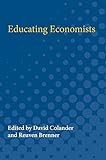Educating economists / edited by David Colander and Reuven Brenner.
Material type: TextLanguage: English Publication details: Ann Arbor : University of Michigan Press, 1992.Description: x, 294 pages : illustrations ; 24 cmISBN:
TextLanguage: English Publication details: Ann Arbor : University of Michigan Press, 1992.Description: x, 294 pages : illustrations ; 24 cmISBN: - 047206486X (paper : alk. paper)
- 9780472064861 (paper : alk. paper)
- 0472094866 (cloth : alk. paper)
- 9780472094868 (cloth : alk. paper)
- 330/.071/173 20
- HB 74.5 E24 1992
| Item type | Current library | Home library | Collection | Shelving location | Call number | Copy number | Status | Date due | Barcode |
|---|---|---|---|---|---|---|---|---|---|
 Libro
Libro
|
Biblioteca Juan Bosch | Biblioteca Juan Bosch | Ciencias Sociales | Ciencias Sociales (3er. Piso) | HB 74.5 E24 1992 (Browse shelf(Opens below)) | 1 | Available | 00000071120 |
Papers from the 12th annual Middlebury College conference on economic issues, held on the spring of 1990.
Includes bibliographical references (p. 263-279) and index.
General Views of the Economics Profession -- Empirical Foundations of Economics -- Micro and Macro -- Specific Views of the Economics Profession -- Proposals for Reform.
What should economists learn in undergraduate and graduate programs? And how does this differ from what students are being taught? In a series of provocative essays, the contributors to Educating Economists cast a critical eye upon the profession and offer solutions to the serious problems they identify in contemporary economics education. The failure of economics teaching is the theme that connects all of the papers in this volume: the failure to develop the skills needed by undergraduate teachers of economics and the failure to prepare students to do work in government and business. The authors point out that professors have lost sight of the skills needed to deal with real-world data, to gain access to existing knowledge, and to critically examine issues, models, and data. Instead, they argue, tenure-minded graduate professors, focused on the use of high-powered mathematical techniques to write formal, technical articles, prepare students only to do abstract research within a framework that just a few other fellow graduates can understand. This situation results in the systematic degradation of the quality of undergraduate economics education and of the institutional usefulness of economics. The contributors conclude that a substantial restructuring of economics education and of the economics profession, including its tenure requirements, is needed and would allow the discipline—and its practitioners—to make a much stronger and more relevant contribution to the people and institutions whose behavior it attempts to explain.


There are no comments on this title.